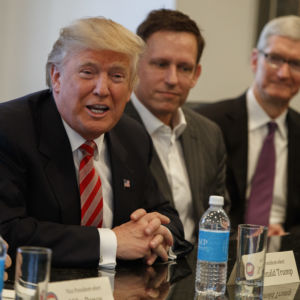Congress released its long-awaited first report on criminals and terrorists “going dark” online via encryption this week, and its conclusions may set the stage for another battle between legislators and President-elect Donald Trump.
The report released late Tuesday by a bipartisan working group of lawmakers refutes calls by FBI Director James Comey and Trump for what are essentially “back doors” into encryption platforms from Apple, Android, WhatsApp and others to surveil the communications of criminals and terrorists.
“Congress should not weaken this vital technology because doing so works against the national interest,” the report reads. “However, it should not ignore and must address the legitimate concerns of the law enforcement and intelligence communities.”
Lawmakers from the House Judiciary and Energy and Commerce Committees including Republican Reps. Bob Goodlatte of Virginia, Fred Upton of Missouri, Darrell Issa of California and Jim Sensenbrenner of Wisconsin worked alongside Democratic Reps. Yvette Clarke of New York and Zoe Lofgren of California to draft the report.
Its findings highlight the criticisms raised by privacy advocates, experts and firms behind the tech that back doors make encrypted platforms more vulnerable in a world of increasing cyber threats. Lawmakers also pointed out the current legal landscape and global availability of encryption products make it difficult to seek warrants for data and easy for bad actors to transition from one service to another — little incentive for weakening U.S. products technically and competitively.
“Encryption technology is free, widely available, and often open source,” the report states. “Law enforcement stakeholders acknowledged to the EWG [Encryption Working Group] that a congressional mandate with respect to encryption — requiring companies to maintain exceptional access to data for law enforcement agencies, for example — would apply only to companies within the United States. The consequences for such a policy may be profound, but they are not likely to prevent bad actors
from using encryption.”
The report comes 10 months after the FBI tried to sue Apple to break into the iPhone of one of the shooters involved in the ISIS-inspired shooting in San Bernardino last December that left 14 dead. Apple refused, and the FBI dropped its lawsuit after hiring a third party to crack the phone’s encryption.
In the midst of the debate Trump blasted Apple on the campaign trail, saying the company should unlock the phone for authorities and calling for a boycott of Apple products until the company complied with the FBI request.
“Apple ought to give the security for that phone, okay,” Trump said in February. “What I think you ought to do is boycott Apple until such a time as they give that security number. How do you like that? I just thought of it. Boycott Apple.”
“The phone’s not even owned by this young thug that killed all these people,” he continued. “The phone’s owned by the government, OK, it’s not even his phone. But [Apple CEO] Tim Cook is looking to do a big number, probably to show how liberal he is. But Apple should give up, they should get the security or find other people.”
Cook was one of a number of tech leaders to huddle with Trump at Trump Tower in New York last week, where he expressed a desire to help Silicon Valley succeed.
The Computer and Communications Industry Association (CCIA), which represents several other companies in attendance at the meeting including Amazon, Facebook, Google and Microsoft, signaled support for the report’s findings.
“This report is welcomed news for those who care about personal, economic, and national security,” CCIA CEO Ed Black said in a statement. “We are glad that after close examination of the security and technical issues, these leading lawmakers understand the considerable stakes and support strong encryption. Deploying weakened forms of encryption in online services and consumer devices is shortsighted and would play directly into the hands of those who would do us harm.”
While Comey’s years-long campaign asking Congress to intervene failed to convince lawmakers or the Obama administration to weigh in, Trump’s comments suggest he may have a more sympathetic White House after Trump takes office on January 20.
The comments also suggest a second point of contention between Trump and a bipartisan group of influential lawmakers, many of whom are calling for a special investigation into Russia’s interference in the recent presidential election — a notion Trump has repeatedly dismissed.

